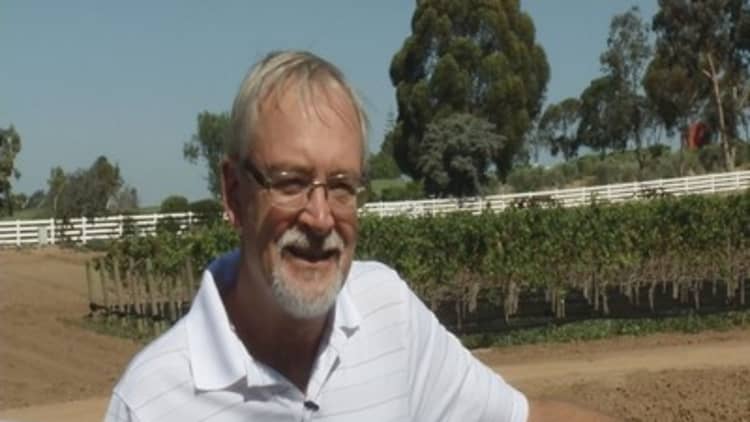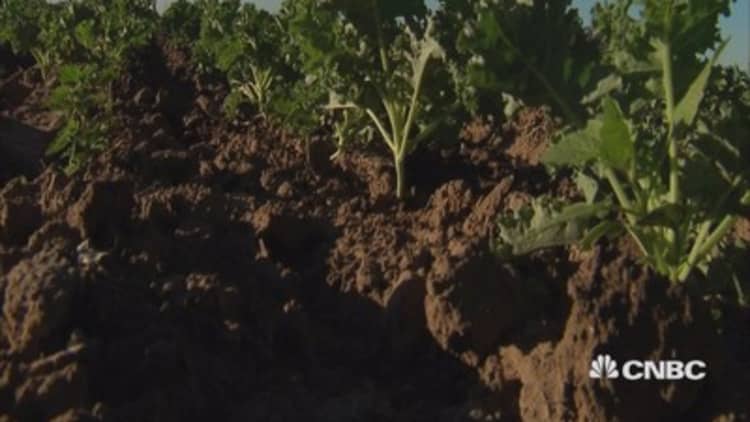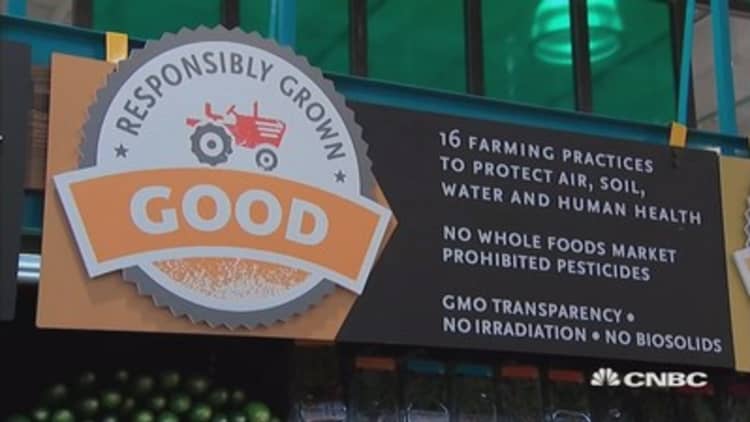
The idea behind organic food is that "natural" is better. Better for the soil, the environment and the body. That's why some Americans are willing to pay twice as much to go organic.
Even at Wal-Mart. For example, a can of organic pumpkin on Walmart.com sells for 22 cents an ounce, more than double the price of conventional canned pumpkin at the same store.
Here's why we pay more: A study done by Consumers Union back in 2002 found that organic food it tested had only one-third the pesticide residue of conventionally grown food. The assumption is that pesticide residue on conventionally grown food is unhealthy, or that any pesticide residue is bad.
Is organic healthier?
Three years ago, Stanford Medicine published a study in the Annals of Internal Medicine comparing the nutritional value of organic and non-organic foods. Senior author Dr. Dena Bravata, a practicing internist, concluded, "There isn't much difference between organic and conventional foods, if you're an adult and making a decision based solely on your health."
The Mayo Clinic concurs. When asked the question, "Is organic healthier?" it replied, "Probably not, but the answer isn't yet clear."
In the U.K., organic farmers are not allowed to make claims the food is healthier. The country's Food Standards Agency says on its website that consumers buy organic food for reasons including animal welfare and that eating organic food "is one way to reduce consumption of pesticide residues and additives." But in terms of nutrition, the agency says, "Consumers may also choose to buy organic food because they believe that it is safer and more nutritious than other food. However, the balance of current scientific evidence does not support this view."
Is organic safer?
The Stanford doctors found that organic produce was 30 percent less likely to have pesticide contamination — though it wasn't necessarily pesticide-free, and the conventionally grown produce were found to have residue levels that "generally fell within allowable safety limits."
"Two studies of children consuming organic and conventional diets did find lower levels of pesticide residues in the urine of children on organic diets, though the significance of these findings on child health is unclear," they wrote. "Additionally, organic chicken and pork appeared to reduce exposure to antibiotic-resistant bacteria, but the clinical significance of this is also unclear."
Garrett Nishimori is chief marketing officer at San Miguel Produce in Oxnard, California. His family grows both conventional and organic leafy greens. "I eat conventional all the time because I know what the farmer is doing," Nishimori said with a laugh. "The chemicals that we do use (on the conventional side) are very heavily regulated by the county, by the state and the federal government, so I do feel safe."

Even on organic farms, not everything is always natural. Under USDA rules, organic farmers are still allowed to use some synthetic pesticides and herbicides that include things like copper. But much of the concern about safety involves fertilizers. Organic farmers often use manure, which can carry dangerous pathogens such as e. coli. Under the USDA's organic program, a crop that touches manure-based fertilizer cannot be harvested for four months. However, the FDA had proposed more than doubling that time, to nine months, to cut down the risk of pathogens' making their way into the food chain. Organic farmers pushed back, and this week the FDA blinked, deferring any decision until it does more research.
Is it good for the environment?
Steve Savage, a plant pathologist who has helped develop pesticides for chemical giant DuPont and others, said he thinks there's too much faith and not enough science behind the organic movement. And he makes environmental arguments to back up his point.
Savage argued that manure-based fertilizer and compost present their own problems. They release nutrients on their own timetable, not necessarily when a crop needs it. This not only affects yields, but it has potential environmental fallout.
"If you have the manure or the compost continuing to release things when the plant doesn't really need it anymore, then those have the opportunity to either leech into groundwater or run off into the surface water, or get converted into nitrous oxide, which is a really potent greenhouse gas," Savage said.

The lower production of organic farms is running into higher demand for organic products. That's why so many farmers either want to convert conventional farms to organic, a process that takes three years, or find virgin land to begin farming. However, Savage said it would be impossible for the United States to grow all of its food organically.
"We would need 109 million more acres, which is roughly the area of all the natural parks and wild land in the United States," he said. Savage added that turning virgin land into farms releases huge amounts of carbon. "That's something you would like to keep to an absolute minimum."
On the plus side for the environment, a story in The Washington Post showed that organic farmers use less energy. That's because much of their fertilizer comes from local animals and doesn't have to be trucked in, cutting down on fuel use. For conventional farmers, "The manufacture and transport of synthetic nitrogen requires a tremendous amount of oil," said Mark Smallwood of the Rodale Institute, which promotes organic farming.
Savage said he believes that, bottom line, consumers should feel safe eating food grown in the United States (he's not as secure about food imported from other countries). He said rules and regulations about conventional pesticides and herbicides have completely remade agriculture over the last 35 years.
"If we really had a two-tier system, where unless you could pay more, you couldn't get safe food, that would be a wholesale failure of our regulatory (system), a wholesale failure of our environmental movement," he said.



